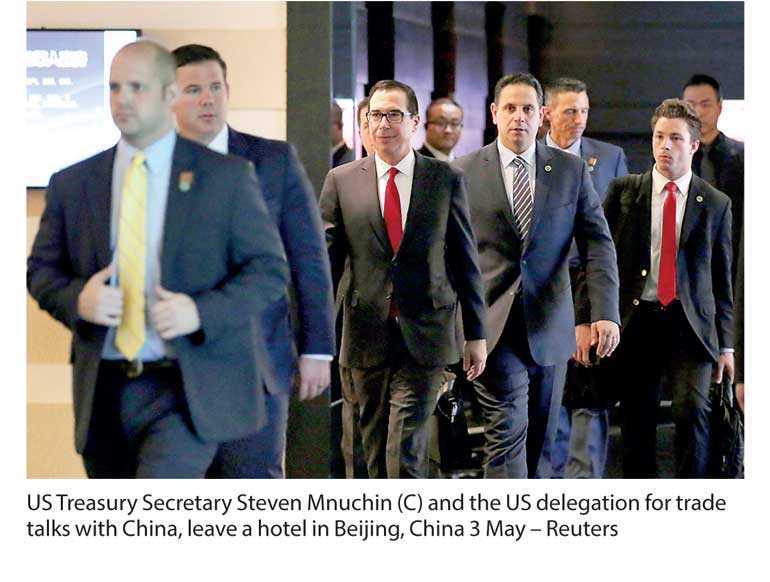Sunday Feb 22, 2026
Sunday Feb 22, 2026
Friday, 4 May 2018 00:00 - - {{hitsCtrl.values.hits}}
 BEIJING (Reuters): A US trade delegation arrived in Beijing on Thursday for key talks over tariffs, with Chinese state media saying China will stand up to US bullying if needed but that it was still better to hash things out around the negotiating table.
BEIJING (Reuters): A US trade delegation arrived in Beijing on Thursday for key talks over tariffs, with Chinese state media saying China will stand up to US bullying if needed but that it was still better to hash things out around the negotiating table.
A breakthrough deal to fundamentally change China’s economic policies is viewed as highly unlikely during the two-day visit, though a package of short-term Chinese measures could delay a US decision to impose tariffs on around $50 billion worth of Chinese exports.
The discussions, led by US Treasury Secretary Steven Mnuchin and Chinese Vice Premier Liu He, are expected to cover a wide range of US complaints about China’s trade practices, from allegations of forced technology transfers to state subsidies for technology development.
“Thrilled to be here. Thank you,” Mnuchin told Reuters upon arriving at his hotel, when asked if he expected progress. He made no other comments.
As Mnuchin arrived, US President Donald Trump tweeted “Our great financial team is in China trying to negotiate a level playing field on trade! I look forward to being with President Xi in the not too distant future. We will always have a good (great) relationship!”
Throughout his 2016 election campaign, Trump routinely threatened to impose a 45% across-the-board tariff on Chinese goods as a way to level the playing field for American workers. At the time, he was also accusing China of manipulating its currency to gain an export advantage, a claim that his administration has since dropped.
The US Embassy in Beijing said the delegation planned meet Chinese officials on both days, in addition to US Ambassador Terry Branstad, before departing on Friday evening.
In an editorial, the official China Daily said Beijing wanted the talks to produce “feasible solutions to put an end to the ongoing feud” and that they could go well if the US delegation genuinely wants to listen as well as talk.
China “will stand up to the US’ bullying as necessary. And as a champion of globalisation, free trade and multilateralism, it will have strong support from the international community”, the English-language paper added.
“The US wants greater access to China’s market, but it should not use trade actions as a battering ram to force China to open its doors. It is already in the process of opening them wider,” the paper said.
In doing so, China expected Washington to reciprocate and open its market to Chinese investments and competition, it added. Widely-read Chinese tabloid the Global Times, published by the ruling Communist Party’s People’s Daily, said it hoped the talks were the start of a resolution to the dispute. “Washington and Beijing should be clear neither side can scare the other down. Negotiations are the best way to resolve the problem.” The first round of threatened tariffs under the US government’s “Section 301” intellectual property probe focused heavily on technology products benefiting from the “Made in China 2025” program to upgrade China’s domestic manufacturing base with more advanced products.
The US tariffs could go into effect in June following the completion of a 60-day consultation period. China, which denies it coerces technology transfers, has threatened retaliation in equal measure, including tariffs on US soybeans and aircraft.
US-based trade experts said they expected Beijing to offer Trump’s team a package of policy changes that may include some previously announced moves, such as a phase-out of joint venture requirements for some sectors, autos tariff reductions and increased purchases of US goods.
Trump has demanded a $100 billion annual reduction in the $375 billion US goods trade deficit with China.
But the divergent US trade delegation is likely to have differing views on the merits of such an offer.
The group includes Commerce Secretary Wilbur Ross along with noted China hawks Robert Lighthizer, the US trade representative, and White House trade and manufacturing adviser Peter Navarro.